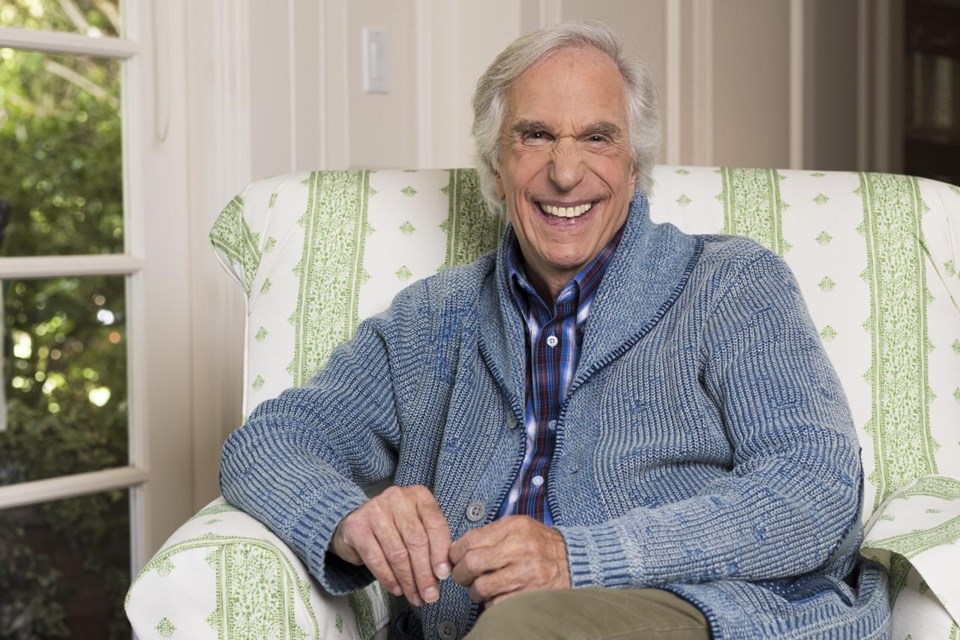If Henry Winkler is not a morning person, it's impossible to tell. He's logged onto Zoom for an interview about his new memoir but occasionally is interrupted by a phone call — which he answers with a cheery “Good Morning.” His granddaughter walks through his home office, as do his dogs. He introduces them. At one point, Winkler stops to point out roses on his desk that he picked from his garden.
The beloved TV icon says this is a good example of his morning routine. He wakes up early and takes care of the dogs. He checks Twitter. “That’s the only social media I do. I like Twitter, but it’s getting tough," Winkler said of the platform now called X. He also likes to play a game on his phone called Zuma. And he occasionally meditates in the middle of the day.
“I listen to sounds of rain. A rainstorm in Cologne. A rainstorm in Scotland. I sit in an armchair and meditate. Two frogs next to a lake in Switzerland. It could really be a rainstorm in West Covina, California. I'd have no idea,” he said.
This overall cheeriness and settled demeanor is particularly interesting because Winkler didn't grow up in a happy home. His parents left Germany in 1939. His father told his mother they were going on a business trip to the United States. They never returned. The rest of their family was killed in World War II by Nazis, Winkler says.
Winkler's parents belittled him because he did poorly in school, thinking “if I stayed at my desk long enough, I was going to get it.” Winkler is dyslexic. The struggles with reading have brought him shame and frustration for much of his life, yet Winkler has gone on to co-write more than one dozen children's books and now a memoir, “Being Henry: The Fonz...and Beyond" was released this week. A new children's book called “Detective Duck” is also available.
Winkler writes about landing the role of Arthur Fonzarelli, the Fonz, on TV’s “Happy Days'' in a 1973 audition. The role made him an overnight star. In 2018, he received his first primetime Emmy for his role as Gene Cousineau on "Barry.''
Winkler spoke with The Associated Press about making peace with the lack of relationship with his parents, experiencing superstardom on the sitcom “Happy Days” and his decades-old friendship with Ron Howard.
The conversation has been edited for clarity and brevity.
AP: You've written so many books. How does that feel in light of your dyslexia struggles?
WINKLER: I have never gotten used to it. I cannot believe that dummer Hund, that dumb dog, (a name his parents called him) has done this accomplishment. And the great thing is there is always a way. You think you can’t do something, but there is a way. That is one of the things I would like to pass on.
AP: You seem matter-of-fact about your poor relationship with your parents.
WINKLER: It might be crazy on my part, but I have never mourned not having a relationship with them. You know, people have said to me, ‘My parents are my best friends. Oh my God. I miss my parents.' It was like they were talking Russian to me. I didn’t understand what they were saying to me in any shape, way, form but I had to figure it out. And I made a deal with myself and then with my wife, Stacey, I would be a different parent. I think I’ve done a mostly good job.
AP: Did they ever acknowledge your acting talent or that performing was the right thing for you?
WINKLER: No. Only when it benefited them. They called themselves, which I think was so telling, “the co-producers of the star.” So they were going to figure out a way in, even though they did not want me to do what they later became the creators of.
AP: You write about rising to fame overnight as Fonzie on “Happy Days." How did you handle that attention?
WINKLER: You’re treated like you can walk on water. Not just me, but, you know, whoever is hot at the moment. But you cannot get lost in that because you will drown...I see power as a mirage... So you let other people think you’re powerful, and you just go about your business and enjoy your puppies and your work and your family.
AP: One surprise in the book was how ABC wanted to rename “Happy Days” to “Fonzie's Happy Days” to capitalize on your popularity, but you asked them not to.
WINKLER: I was very aware that it would be so hurtful, a slap in the face to these people that helped me get to the position where they could want to change the name of the show or give me my own show. It would have been disastrous.
AP: And you're still close to Ron Howard.
WINKLER: They were just here. His whole family and mine talking about when Ron called me to tell me he was leaving “Happy Days.”
He called me on the pay phone on soundstage 19, right next to the donuts. He said, ‘I’m not coming back.’ And I was silent.
What I didn’t know was the other end of that silence. Ron told me the other night, 'I didn’t know what to expect, but there was this long silence. And then you said, ‘You know what, Ron? Go and do this. Get this. This is yours. You want this. We’ve talked about it for the last seven years. It’s your dream.’
He said, ‘When you said that to me, I knew I was doing the right thing.’ I said, ‘It took you 50 (expletive) years to tell me that? You couldn’t have shared that with me?’ But it was so powerful.
Alicia Rancilio, The Associated Press



